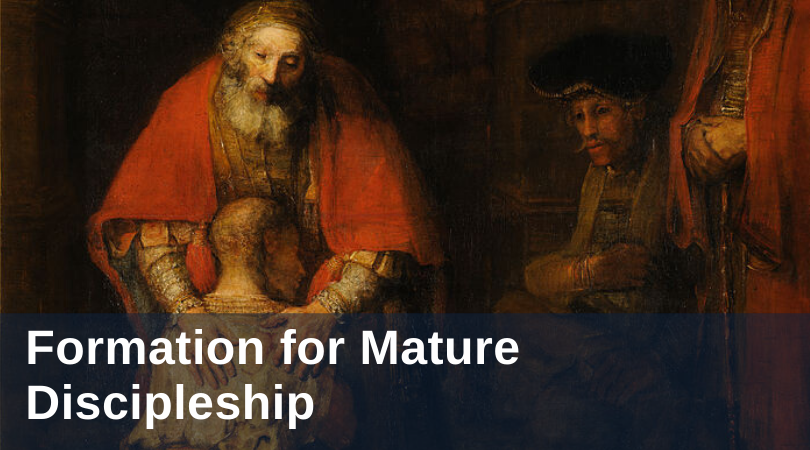
What does spiritual maturity look like? Instead of laying forth specific criteria, let us enter into an imaginative contemplation of the parable of the prodigal son (Luke 15:11–32) as inspiration for creative consideration of the call to grow in authenticity and intimacy with Christ.
Drawing on Henri Nouwen’s spiritual classic The Return of the Prodigal Son, as we pray with this parable, we may begin to recognize ourselves in the three main persons in the narrative: our rebellion and waywardness in the younger son, our anger and resentment in the elder son, and our love, forgiveness, and generosity in the father.
The younger son leaves and then returns; the elder son stays home but ends up lost; the Father goes out to both sons in love, drawing them home. Setting the parable within the context of salvation history, we recognize our beginning in the home, the household of love. Our rejection of God the Father’s love leads to a journey to a distant land where we come to our senses and return home, seeking forgiveness where our Father waits to welcome us with outstretched arms.
Yet in our journey to mature discipleship, we also look to the elder son, standing outside of the house, filled with anger and resentment at both the younger son’s return and the lavish welcome he receives. While he never left home, the elder son has become “lost” in his obedience, and his duty has become a burden. This perceived burden twisted into resentment that diminished his capacity to recognize the love offered by his father, leaving him unable to participate in and receive joy.
At the end of the parable, the elder son faces a choice: to hold on to his resentment and anger or to ‘come home.’ The parable ends without his answer and the decision he faced becomes ours. How do we respond to the generous love of the Father poured out for us?
For the elder son—for us—to return home, we must first recognize that we are in fact lost, and then prepare ourselves to be found and brought home by the Father. To resist the temptation to settle into a “complaintive” way of life that follows the path of the elder son, we are called to cultivate a “contemplative” way of life through practices of trust and gratitude.
We recognize Jesus as the beloved Son who was sent to bring us all home to the Father as children of God. Jesus’ whole life and preaching reveal the unlimited and eternal love of God the Father and invite us to let that love shape every part of our lives.
This ordering of our lives in response to the love of the Father, to the Paschal Mystery of Jesus Christ, to the guidance of the Holy Spirit—this is what mature discipleship looks like.
Spiritual maturity is experienced as an unfolding and deepening of one’s authentic, intimate relationship with God that leads toward a re-ordering of one’s life in light of Christ and calls forth from within us a generous outpouring of loving service to others.
Formation for mature discipleship includes cultivating the dispositions, skills, and behaviors that allow us to reflect on the gifts given to us by God, perceive the reality of the world, identify the needs around us, and then creatively respond to those needs rooted in humility and gratitude for the gifts given to us by God.
The Father’s love is offered personally to both sons, and he wants his children to learn to love as he does. Loving like the Father is not lived out in the abstract, but in a particular place with particular people. We are called to love like the Father by practicing compassion, forgiveness, and generosity with others, loving them without any expectation of return.
Practices of Christian maturity allow the dispositions we cultivate to become embodied in behaviors that shape and form us as we grow in intimacy with Christ.
- Envisioning the future that we are invited to by God opens our minds and hearts to the Holy Spirit to inspire our creativity and imagination.
- Grounded in Scripture, the witness of the saints, and the sacramental life of the Church, we live into that future in the present, taking responsibility each day for our choices to build up the Kingdom of God.
- A life of discipleship requires a (re)ordering of one’s life in light of the call to follow Christ: choosing generosity, humility, compassion, and gratitude over self-interest, pride, riches, or glory.
- Regular participation in the sacramental life of the Church nourishes us, heals us, and sends us forth in mission to witness to the love of the Father.
Like what you read? Submit your email below to have our newest blogs delivered directly to your inbox each week.
Featured image: Rembrandt van Rijn, The Return of the Prodigal Son, via Wikimedia Commons; public domain.


